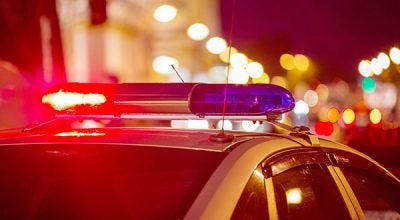SMC president skydiving into Cass County Relay for Life
Published 9:24 am Wednesday, June 8, 2016

- SMC President Dr. David Mathews.
Southwestern Michigan College President Dr. David Mathews will help Cass County Relay for Life feel like old times when he skydives into opening ceremonies at the Cassopolis fairgrounds Friday, June 17.
“My thought was to try something out of the ordinary to bring people in,” said organizer Gary Peffley, who likes to do events in a big way if you remember Christmas light displays he created in Pokagon.
With 14 teams and 97 participants, the June 17-18 Relay passed $18,000 by June 1.
Additional teams can sign up online at www.RelayForLife.org/dowagiacmi.
Mathews began skydiving in 1980 while a student at Michigan State University.
He was hooked after his first jump, competed in national collegiate parachuting competitions and was an avid skydiver before joining the Army, where he became an Airborne Ranger, then a Green Beret.
He commanded a Special Forces HALO (high altitude-low opening) team, whose primary means of transportation was free-fall parachuting.
When he left the military for graduate school, Mathews hung up his parachute until 2014, when he skydived for SMC’s 50th anniversary celebration.
Mathews also took his son Michael to Texas for free-fall training.
Michael, who just graduated from SMC, is also a licensed skydiver.
Weather permitting, Mathews will parachute into the campground on the north end of the fairgrounds, west of the draft horse arena, between 6:15 and 6:30 p.m.
Relay started at SMC, moved to the fairgrounds and returns to Cassopolis from Dowagiac Union High School.
“When I took over the event this year,” the cancer survivor and eight-year volunteer said, “my goal was to try to get it back as a county event.”
Relay took place at the fairgrounds from 2004-08. It returns to a 24-hour event from 6 p.m. June 17 to 6 p.m. June 18, after lasting 12 hours in 2015.
Peffley, who leaves for Alaska after Relay, was diagnosed in 2008 with stage-four colorectal cancer and given six months to live.
Stage four means cancer has spread to other organs or parts of the body.
“I wouldn’t be here without progress Relayers have made. The doctor sat my wife and me down and told me to get my affairs in order. I attribute it to research that’s been done developing new treatments and new drugs — and I’m a fighter. I underwent 38 radiation treatments, 2 1/2 years of chemotherapy and three major surgeries.
“Six percent ACS takes in goes for salaries and operating budget, the rest to research facilities and programs. I was very fortunate I had good health insurance. Cancer care is expensive. There’s no way a normal person is going to survive the cost. My chemo treatments cost $17,000 every two weeks. My family has had a lot of cancer, including three of my brothers. We’re all survivors so far. (Relay) makes a difference in people’s lives. Twenty years ago, when a doctor told you you had cancer, you went home and got your affairs in order because you knew you were going to die. It’s not like that today.”
Besides skydiving, “We’re doing a motorcycle show Friday night and cars on Saturday. An antique tractor club is bringing tractors and may do some pulling.
“We’re trying to get youth more involved. Youth help keep everything flowing at these events. People my age don’t want to enter Hula Hoop contests, play flag football, cardio-drum or do Zumba. Our committee elected to go back to a 24-hour event and try to get people from the whole county. Last year we got stormed out so we had a luminaria ceremony in September around the COA track.”
Where walkers once relied on pledges to raise money, today’s teams fundraise year-round, organizing spaghetti suppers, yard sales and bake sales.
“I started planning this year’s event the day after Relay,” Peffley said. “I rented a booth at the fairgrounds and promoted Relay for Life all week — Hope Lodges (free places to stay in more than 30 U.S. locations) and Road to Recovery (a transportation program for which Peffley volunteers to provide rides to medical treatments). ACS has an 800 number (1-800-227-2345) manned 24/7, 365 days a year. Not many people have not been touched by cancer.”
Southwestern Michigan College is a public, residential and commuter, community college, founded in 1964. The college averages in the top 10 percent nationally for student academic success based upon the National Community College Benchmark Project. Southwestern Michigan College strives to be the college of first choice, to provide the programs and services to meet the needs of students, and to serve our community. The college is accredited by The Higher Learning Commission of the North Central Association of Colleges and Schools and is a member of the American Association of Community Colleges.






